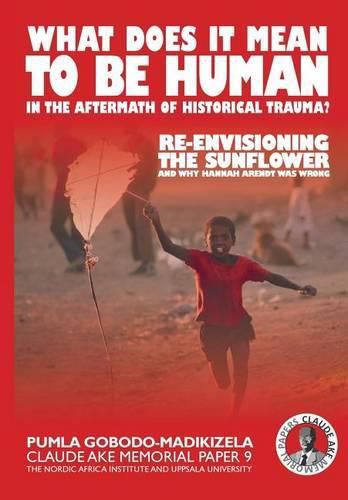Readings Newsletter
Become a Readings Member to make your shopping experience even easier.
Sign in or sign up for free!
You’re not far away from qualifying for FREE standard shipping within Australia
You’ve qualified for FREE standard shipping within Australia
The cart is loading…






What does it mean to be human in the aftermath of mass trauma and violence? When victims and perpetrators of gross human rights violations live in the same country, and sometimes as neighbours, what strategies can help individuals and communities deal with trauma in a way that restores dignity to victims and enables perpetrators to be accountable for their crimes? This essay explores these questions. Examples that illustrate attempts to create sites for listening, for moral reflection and for initiating the difficult process of dialogue at community and individual levels after mass trauma and violence are discussed. It is argued that in the aftermath of historical trauma, restoring human bonds requires a new vocabulary of re-humanization. This new mode of being human calls for a reparative humanism that opens towards a horizon of an ethics of care for the sake of a transformed society.
Examples drawn from two sources are discussed to explore the idea of an ethics of care. First, insights from the Truth and Reconciliation Commission (TRC) of South Africa are discussed to show how the work of the TRC enabled dialogic spaces in which new subjectivities emerged in the encounter between victims/survivors and perpetrators. Second, the essay engages in a reinterpretation of Simon Wiesenthal’s book The Sunflower as a story that continues to pose a challenge about how to reclaim a sense of being human in the aftermath of unspeakable crimes against humanity. The essay concludes with a critical reflection on Emmanuel Levinas’ ethics of responsibility as an important vision in societies dealing with a violent and traumatic past.
$9.00 standard shipping within Australia
FREE standard shipping within Australia for orders over $100.00
Express & International shipping calculated at checkout
What does it mean to be human in the aftermath of mass trauma and violence? When victims and perpetrators of gross human rights violations live in the same country, and sometimes as neighbours, what strategies can help individuals and communities deal with trauma in a way that restores dignity to victims and enables perpetrators to be accountable for their crimes? This essay explores these questions. Examples that illustrate attempts to create sites for listening, for moral reflection and for initiating the difficult process of dialogue at community and individual levels after mass trauma and violence are discussed. It is argued that in the aftermath of historical trauma, restoring human bonds requires a new vocabulary of re-humanization. This new mode of being human calls for a reparative humanism that opens towards a horizon of an ethics of care for the sake of a transformed society.
Examples drawn from two sources are discussed to explore the idea of an ethics of care. First, insights from the Truth and Reconciliation Commission (TRC) of South Africa are discussed to show how the work of the TRC enabled dialogic spaces in which new subjectivities emerged in the encounter between victims/survivors and perpetrators. Second, the essay engages in a reinterpretation of Simon Wiesenthal’s book The Sunflower as a story that continues to pose a challenge about how to reclaim a sense of being human in the aftermath of unspeakable crimes against humanity. The essay concludes with a critical reflection on Emmanuel Levinas’ ethics of responsibility as an important vision in societies dealing with a violent and traumatic past.